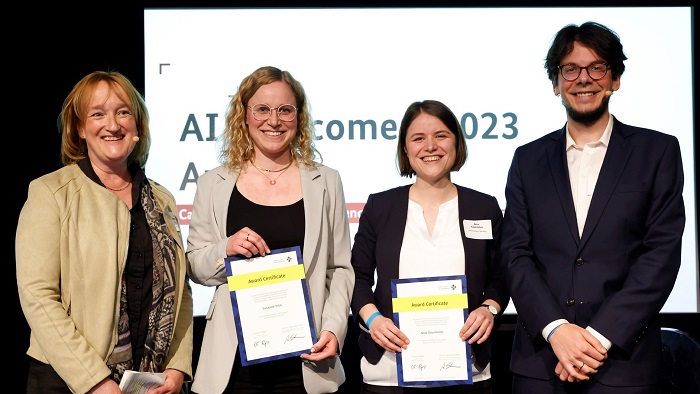Student of the Elite Network receives AI Award
Nora Gourmelon, who is part of the International Doctorate Program (IDP) “Measuring and Modelling Mountain glaciers and ice caps in a Changing ClimAte (M³OCCA)”, was honored with the AI Newcomer Award 2023 in the field of natural and life sciences for her research in Green AI, a research field that tackles sustainability-related problems with AI. In her current work, conducted as part of the IDP, she is developing deep-learning techniques for extracting glacier front positions from satellite imagery. The award ceremony took place in Berlin on April 26th as part of “KI-Camp 2023,” an event for young AI researchers organized by the German Association of Computer Science and the German Federal Ministry for Education and Research (Bundesministerium für Bildung und Forschung).
Nora Gourmelon is doing her doctorate at the Chair of Pattern Recognition at Friedrich-Alexander University Erlangen-Nuremberg. After studying computer science, she is now conducting research in the field of "green AI". She is particularly interested in the water consumption behavior of households, the detection of seabirds in video-based population surveys, and the localization of break-off edges, and the determination of the ice thickness of melting glaciers. Her work on the application of machine learning to the classification of water end-use categories has received several awards, including the Best Paper Award at a recognized conference. In collaboration with the German Federal Agency for Nature Conservation, Ms. Gourmelon is researching how AI can be used to make seabird censuses and species surveys more efficient. Initial successes promise great potential in terms of labor and time savings and, thus, more timely information available for species conservation. In order to make research on appropriate Deep Learning techniques for localizing glacier break-off edges in satellite imagery comparable and reproducible, Ms. Gourmelon has published a benchmark dataset together with baseline algorithms. By improving the localization of the break-off edges and a more accurate determination of the ice thickness, a higher accuracy of climate models can be achieved, which form the basis for recommendations of science to politics (e.g., IPCC reports).
When asked what the award means to her, Gourmelon responds: “The award helps to raise awareness of how you can also get involved in biodiversity and climate protection as a computer scientist. In addition, I am, of course, also very pleased about the great recognition for my research to date.”
Text: Nora Gourmelon, International Doctorate Program "Measuring and Modelling Mountain glaciers and ice caps in a Changing ClimAte (M³OCCA)"


